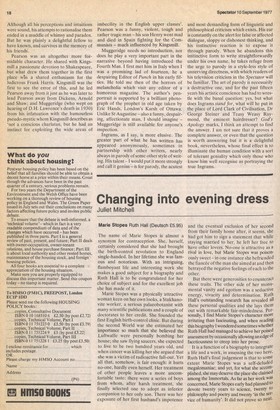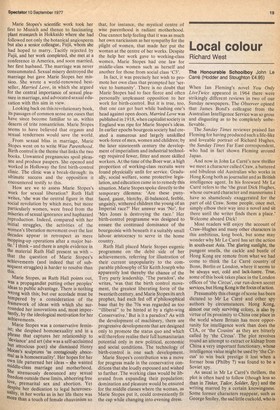Changing into evening dress
Juliet Mitchell
Marie Stapes Ruth Hall (Deutsch £5.95) The name of Marie Stopes is almost a synonym for contraception. She, herself, certainly considered that she had brought the birth-control revolution to England single-handed. In her lifetime she was famous and notorious. With an intriguing, flamboyant life and interesting work she makes a good subject for a biography and Ruth Hall is to be congratulated for her choice of subject and for the excellent job she has made of it.
Marie Stopes was a physically attractive woman keen on her own looks, a Stakhanovite worker, a serious palaeobotanist with many scientific publications and a couple of doctorates to her credit. She founded the first English birth-control clinic. But during the second World war she estimated her importance so much that she believed the Luftwaffe were personally bombing her house; she saw flying saucers, she expected to live to be two hundred years old, and when cancer was killing her she argued that she was a victim of radioactive fall-out. Yet all that, somehow, is fair enough: it hurts no-one, hardly even herself, Her treatment of other people leaves a more uncomfortable taste: there were a series of boys from whom, after harsh treatment, she finally selected one to adopt as inferior companion to her only son. There was her exposure of her first husband's impotence and the eventual exclusion of her second from their family home after, it seems, she had got him to sign a statement that while staying married to her, he left her free to have other lovers. No-one is attractive as a rival in love, but Marie Stopes was poisonously sweet in one instance she befriended the fiancée of the man she aimed at and then betrayed the negative feelings of each to the other.
But there were generosities to counteract these traits. The other side of her monumental vanity and egotism was a seductive energy, vivacity and determination. Ruth Hall's outstanding research has revealed al] these personal qualities and she lays them out with remarkable fair-mindedness. Personally, I find Marie Stopes's character more irritating than fascinating, and when reading this biography !wondered sometimes whether Ruth Hall had managed to achieve her poised assessment by occasionally allowing an edge of facetiousness to creep into her prose. It is a function of a biography to integrate a life and a work, in assessing the two here, Ruth Hall's final judgement is that to some extent Marie Stopes was a self-deluded megalomaniac; and yet, for what she accomplished, she may deserve the place she claimed among the Immortals. As far as her work was concerned, Marie Stopes early had planned to devote twenty years to science, twenty to philosophy and poetry and twenty 'in the service of humanity'. It did not prove so neat. Marie Stopes's scientific work took her first to Munich and thence to fascinating plant reasearch in Hokkaido where she had followed not only the botanical angiosperm but also a senior colleague, Fujii, whom she had hoped to marry. Tacitly rejected by Fujii, and her work completed, she met at a conference in America, and soon married, her first husband. The marriage was never consummated. Sexual misery destroyed the marriage but gave Marie Stopes her mission. She wrote a world-renowned bestseller, Married Love, in which she argued for the central importance of sexual pleasure in marriage, and advocated sexual education with this aim in view.
Looking back on this revolutionary book, its passages of common sense are oases that have since become familiar to us, within deserts of trite romanticism. Marie Stopes seems to have believed that orgasm and sexual tenderness would save the world.
From sexual bliss in marriage, Marie Stopes went on to write Wise Parenthood. Birth control is the theme that links the two books. Unwanted pregnancies spoil pleasure and produce paupers. She opened and worked in Holloway the first birth-control clinic. The clinic was a break-through: its ultimate success and the opposition it encountered testify to this.
How are we to assess Marie Stopes's work for sexual liberation? Ruth Hall writes, 'she was the central figure in that social revolution by which men, but more Particularly women, were freed from the miseries of sexual ignorance and haphazard .reproduction. Indeed, compared with her initial struggles, the activities of the women's liberation movement over the last decades appear in retrospect as mere mopping-up operations after a major battle.' I think — and there is ample evidence in the material Ruth Hall present us with — that the question of Marie Stopes's achievements (and indeed that of subsequent struggles) is harder to resolve than this.
Marie Stopes, as Ruth Hall points out, "as a propagandist putting other peoples' ideas to public advantage. There is nothing wrong with this; but our accolade must be tempered by a consideration of• the framework of ideas with which she surrounded her innovations and, most importantly, by the ideological motivation for her achievements , Marie Stopes was a conservative femin1st; she despised homosexuality and in a Phrase that captures her relationship to 'deviance' and art (she was a self-acclaimed but atrocious poet) she dismissed Henry Moore's sculptures 'as contagiously abnormal as is homosexuality'. Her hopes for her 0", n life patterned her ideas — she wanted middle-class marriage and motherhood. She strenuously denounced any sexual freedom outside these limits, abhorring free love, premarital sex and abortion. Yet despite her dedication to legal heterosexuality, in her works as in her life there was more than a touch of female chauvinism so that, for instance, the mystical centre of wise parenthood is radiant motherhood. One cannot help feeling that it was as much her own naricissism as her sympathy for the plight of women, that made her put the woman at the centre of her works. Despite the help her work gave to working-class women, Marie Stapes had one law for middle-class women such as herself and another for those from social class `C3'.
In fact, it was precisely her wish to promote her own class that prompted her 'service to humanity'. There is no doubt that Marie Stopes had to face fierce and often personally unpleasant opposition to her work for birth-control. But it is true, too, that one can get hurt while bashing one's head against open doors. Married Love was published in 1918, when capitalist society in England was ripe for Marie Stopes's ideas. In earlier epochs bourgeois society had created a numerous and largely unskilled work-force of men, women and children; by the later nineteenth century the development of imperialism and industrial technology required fewer, fitter and more skilled workers. At the time of the Boer war, a high proportion of working-class recruits were found physicially unfit for service. Gradually, social welfare, some protective legislation, and education came in to remedy this situation. Marie Stopes spoke directly to the temporary dilemma: 'Are these punyfaced, gaunt, blotchy, ill-balanced, feeble, ungainly, withered children the young of an Imperial race?' Her answer was 'No', for 'Mrs Jones is destroying the race.' Her birth-control programme was designed to ensure the continued dominance of the bourgeoisie with beneath it a suitably small labour aristocracy to serve in the home country.
Ruth Hall placed Marie Stopes eugenic programme on the debit side of her achievements, referring for illustration of their current unpopularity to the comparable philosophy of Sir Keith Joseph who apparently lost thereby the chance of the Tory party leadership, 'The paradox', she writes, 'was that the birth control movement, the greatest liberating force of the twentieth century, and Marie Stopes its arch prophet, had each fed off trphilosophical base that by the 70s was regarded as too "illiberal" to be hinted at by a right-wing Conservative.' But is it a paradox? As with the development of machinery, there are progressive developments that are designed only to promote the status quo and which will therefore realise their full humanitarian potential only in new political, economic and social conditions. The technology of birth-control is one such development.
Marie Stopes's contribution was a move for progress made in the conservative conditions that she loudly espoused and wished to further. The working class would be liberated from expanding their population; domination and pleasure would be ensured for the middle classes where the woman, as Marie Stopes put it, could conveniently fit the cap while changing into evening dress.































 Previous page
Previous page